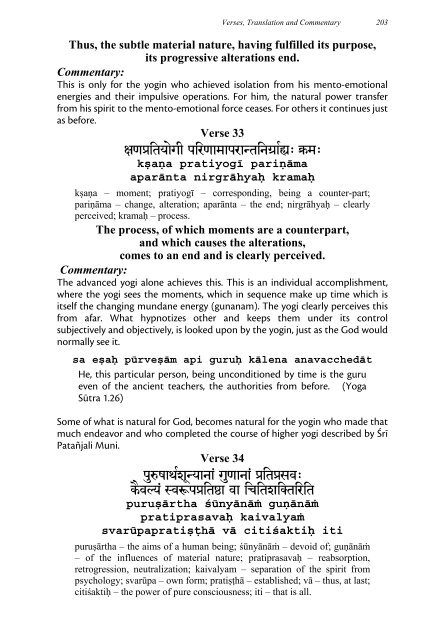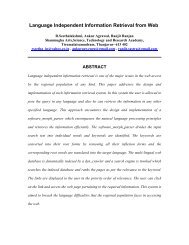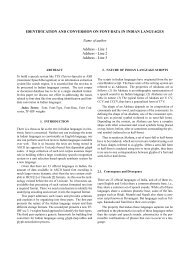Create successful ePaper yourself
Turn your PDF publications into a flip-book with our unique Google optimized e-Paper software.
Verses, Translation and Commentary 203<br />
Thus, the subtle material nature, having fulfilled its purpose,<br />
its progressive alterations end.<br />
Commentary:<br />
This is only for the yogin who achieved isolation from his mento-emotional<br />
energies and their impulsive operations. For him, the natural power transfer<br />
from his spirit to the mento-emotional force ceases. For others it continues just<br />
as before.<br />
Verse 33<br />
][àityaegI pir[amapraNtin¢aRý> ³m><br />
kṣaṇa pratiyogī pariṇāma<br />
aparānta nirgrāhyaḥ kramaḥ<br />
kṣaṇa – moment; pratiyogī – corresponding, being a counter-part;<br />
pariṇāma – change, alteration; aparānta – the end; nirgrāhyaḥ – clearly<br />
perceived; kramaḥ – process.<br />
The process, of which moments are a counterpart,<br />
and which causes the alterations,<br />
comes to an end and is clearly perceived.<br />
Commentary:<br />
The advanced yogi alone achieves this. This is an individual accomplishment,<br />
where the yogi sees the moments, which in sequence make up time which is<br />
itself the changing mundane energy (gunanam). The yogi clearly perceives this<br />
from afar. What hypnotizes other and keeps them under its control<br />
subjectively and objectively, is looked upon by the yogin, just as the God would<br />
normally see it.<br />
sa eṣaḥ pūrveṣām api guruḥ kālena anavacchedāt<br />
He, this particular person, being unconditioned by time is the guru<br />
even of the ancient teachers, the authorities from before. (<strong>Yoga</strong><br />
Sūtra 1.26)<br />
Some of what is natural for God, becomes natural for the yogin who made that<br />
much endeavor and who completed the course of higher yogi described by Śrī<br />
Patañjali Muni.<br />
Verse 34<br />
pué;awRzUNyana< gu[ana< àitàsv><br />
kEvLy< Svêpàitóa va icitziKtirit<br />
puruṣārtha śūnyānāṁ guṇānāṁ<br />
pratiprasavaḥ kaivalyaṁ<br />
svarūpapratiṣṭhā vā citiśaktiḥ iti<br />
puruṣārtha – the aims of a human being; śūnyānāṁ – devoid of; guṇānāṁ<br />
– of the influences of material nature; pratiprasavaḥ – reabsorption,<br />
retrogression, neutralization; kaivalyam – separation of the spirit from<br />
psychology; svarūpa – own form; pratiṣṭhā – established; vā – thus, at last;<br />
citiśaktiḥ – the power of pure consciousness; iti – that is all.










